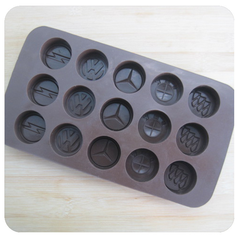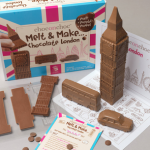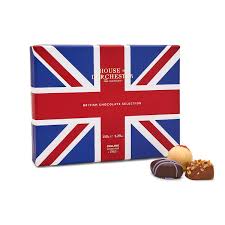As the Moldyfun business is underpinned by silicone cake moulds, we felt it was important to check some key silicone cake mould facts for our customers.
Obviously silicone’s flexibility makes it great for making weird and wonderful cakes, including Kit Kats and Oreos. However it is used widely for many other things too, way beyond bakeware, which really on became a “thing” from the 1980s. Read on to find out more.
Silicone cake mould facts
- Silicone (note the “e”) is not the same as silicon. Silicone is made from silicon, oxygen, carbon and hydrogen. Silicon (no “e”) occurs naturally, and is the 14th element of the periodic table. Interesting if you’re a chemist.
- Silicones have only been produced industrially since the 1940s, but they’re use grew massively after the 1960s. From Post-its, contact lenses and computers through to those silicone cake moulds we know and love, silicones are everywhere. You can also find silicone in a number of personal care items, including shampoos, shaving cream, personal lubricants and sex toys. Say no more. Everywhere.
- Silicone may be healthier to cook with than plastic or Teflon coated non-stick pans. Leaky silicone breast implants gave silicone a bad name, but actually as it’s more inert than plastic. it’s less likely to leach harmful chemicals into food. Health Canada for example says that food-grade silicone does not react with food or produce any hazardous fumes, and as such is safe to use up to recommended temperatures. The FDA has also approved it as “food-safe” – just make sure the moulds are “food grade”.
- You can do a test to see how “pure” your silicone product is. Twist the mould between your fingers. If it changes colour, especially going white, it may contain fillers. The best moulds don’t.
- Silicone cake moulds are more environmentally friendly than plastics. Because they don’t degrade like plastics, they won’t find their way into the food chain in the same way plastics have, especially into the oceans. Silicone moulds are recyclable, and can be incinerated safety without releasing toxic gases. When burned, silicone reverts back into its harmless ingredients: silica, carbon dioxide, and water vapour That said, recycling of silicone is not widely undertaken and it isn’t biodegradable.
- Silicone cake moulds are hugely durable and flexible. They can withstand high temperatures (over 250 °C) and low temperatures (-50 °C) and rapid changes in between. Freezer to cooker? No problem. They are also more than happy being battered by the dishwasher or blasted in the microwave.
- Rubber silicone is non-porous, making it stain-resistant and insusceptible to microbial growth. If you use silicone utensils you’ll notice they don’t keep the smell of the food they’ve been used with.
- Silicone bakeware cools quickly. This means that unlike metal or glass bakeware it can be removed from the oven and within minutes safely handled without the need for gloves. Great if you have kids.
- Silicone cake moulds are immensely flexible, meaning they can be shoved into a cupboard and retrieved without losing their shape. Brilliant if your house is as rammed as mine.
- There are some downsides to the flexibility. Be careful with carrying the moulds when full of mixtures/cake. Their flexibility can make them liable to spill or break (carry them on a tray to be sure). As a tip, it’s still worth greasing the moulds lightly to help get cakes out.
There’s not much you can’t or shouldn’t do with silicone cake moulds. Probably the only things to remember are to avoid using sharp objects to get the cakes out, avoid heating empty moulds, and don’t put them directly into naked flames.
So are they safe?
Of the key silicone cake mould facts, most of the debate revolves around the safety and environmental friendliness. Most major trading blocks (US, Canada, EU) have signed them off as safe to use and environmentally friendly, but their newness means there are personal preferences and opinions in both the for and against camps. However, the prevalence of silicone in many other walks of life means that it’s here to stay, so watch this space!
Where can you buy them?
Oh, and don’t forget the moulds can be used for other things, not just for cakes. Check out Moldyfun’s selection of moulds for cakes to ice cubes, including novelty and exclusive moulds.










